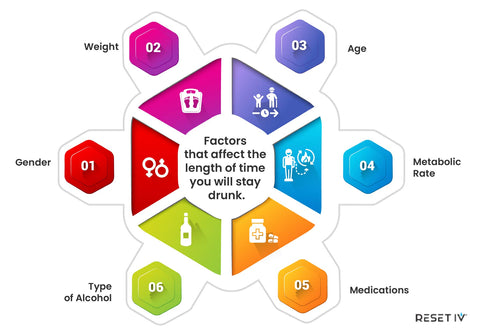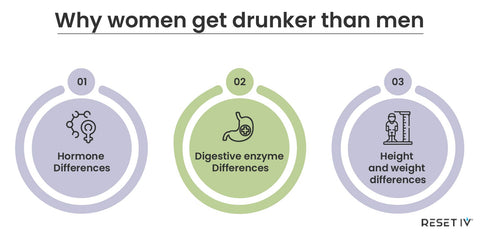Did you drink too much? Click here for help on the recovery.
Alcohol has a profound effect on the functioning of your body.
Though small amounts of alcohol aren’t necessarily harmful, many people seek to avoid prolonged drunkenness and the inevitable hangover that comes afterward.
The length of time that you spend feeling or being drunk will vary depending on different factors that we’ll talk about in detail below.
It is important to remember that alcohol effects everyone differently.
If you wish to control how long you’re drunk for, you’ll need to consider the variables that apply to your body and take control of your drinking habits and food consumption before you go out.

Alcohol’s Duration of Action
Though the metabolism of alcohol actually tends to be fairly constant among people of the same weight, age, and gender, it isn’t possible to predict how long you will feel drunk on the basis of how much you drank.
For example, two people may have the same blood alcohol level, however their blood alcohol concentrations may be different because one person has more water in their body.
People of different weights or genders will differ in terms of how the alcohol is metabolized by their body (which would affect the length of time that they’re drunk).
Below are factors that affect the length of time you will stay drunk:
- Gender
Males and females metabolize alcohol differently because the male body and the female body differs in terms of composition.
Females have more body fat than men and fat tends to retain alcohol which leads to higher blood alcohol concentrations and longer periods of drunkenness than males who drink the same amount.
Also, female bodies contain less water that would dilute alcohol and they produce less of the liver enzyme dehydrogenase than males which would help the liver metabolize the alcohol more quickly.
- Weight
The less you weigh, the less alcohol you can drink before you become drunk.
Alcohol diffuses throughout the body, so bigger bodies cause broader diffusions of alcohol and therefore lower levels of drunkenness than what people with smaller bodies would experience.
If a heavier person drinks the same amount as a person who weighs less, the person who weighs less will feel drunk faster and stay drunk longer (given that all other variables remain the same between both people).
- Age
As people age, muscle mass is replaced by fat tissue and fat tissues retain alcohol.
That means that as people get older, they stay drunk longer per drink than they did when they were younger.
On the other hand though, very young people do not have livers that are fully developed which means that toxins may build up in their bodies more quickly than in older individuals.
This can sometimes lead to feelings of drunkenness and a more intense hangover in younger people.
- Metabolic Rate
The speed with which alcohol is metabolized in the body depends on the presence (or absence) of liver enzymes.
When a person has a high level of enzymes, alcohol is metabolized more quickly. When those levels are low, alcohol is metabolized more slowly resulting in longer periods of drunkenness.
- Amount and Types of Food Consumed While Drinking
If you eat something while drinking, this will have an impact on the duration of your drunkenness.
Foods that have a good balance of proteins, fats, and carbohydrates like unsweetened Greek yogurt may be one of the best foods to eat before you go out drinking.
Protein is particularly important because it digests slowly and can therefore slow absorption and minimize the effects of alcohol on the body.
- Medications
Alcohol may interact negatively with cold, flu, or allergy medications, anti-anxiety medications, angina medications, antibiotics, anti-epilepsy medications and more.
Check with your doctor before drinking if you’re taking meds.
- Liver Disease or Damage
If your liver has been damaged or is diseased, you may notice that drinking only a small amount of alcohol causes intoxication and extreme hangovers.
- The Speed at Which Alcohol Is Consumed
If you drink alcohol very quickly, it will build up in the bloodstream faster than your body will be able to metabolize it.
This will cause a buildup of acetaldehyde in the liver, causing your blood alcohol concentration to rise and the effects of alcohol to increase.
- Type of Alcohol Being Consumed
If you drink an alcoholic beverage that contains a high alcohol content, this will affect how long you stay drunk.
The amount of water that you drink along with your beverage (or as an ingredient in your beverage) can reduce your blood alcohol concentration though it will still take 1 hour for you to metabolize 20 mg/dL of alcohol.
How long do alcohol effects last?
Generally speaking, it takes about 6 hours for the effects of being drunk to wear off.
If you count the hangover/detoxification period that happens after drinking alcohol, the effects may last longer.
For most people, one drink leads to a .02 blood alcohol level. Alcohol is metabolized at an rate of .016 per hour, so even if you drink only one drink per hour, some alcohol can still build up in your system and prolong the effects.
When a person gets drunk, they increase their blood alcohol level dramatically, which causes the classic effects associated with drunkenness. After this, the alcohol must be metabolized and excreted by the body before the effects of alcohol are officially gone.
Can you still be drunk after 24 hours?
See more : Wild Rice vs. Brown Rice vs. Quinoa—Which Is Best?
While in some extreme cases a hangover can last for up to two days, you will not remain drunk after 24 hours.
However, you may feel drunk the morning or afternoon after a heavy night of drinking in that you may be less focused, more irritable, and less coordinated than normal.
This is what is commonly known as a hangover.
When a person drinks a lot in a short period of time, they’re more likely to have a severe hangover than someone who drinks more slowly.
In contrast, drinking a similar amount of alcohol over a longer period of time is less likely to produce a severe hangover that would last longer than 24 hours.
This is primarily due to the fact that the more spaced out each drink of alcohol is, the more effectively your body is able to metabolize the alcohol.
What are the differences between men and women in terms of how long drunkenness lasts?
As we stated earlier, men and women differ in terms of their body composition and the amount of enzymes in the liver that are available to metabolize alcohol.
As a general rule, women metabolize alcohol more slowly and the extra fat that they have in their bodies causes them to retain alcohol for a longer period of time than men. A night of heavy drinking is usually defined as 5 or more drinks for men, and 4 or more drinks for women.

What Causes the Behaviors and Feelings Associated with Drunkenness?
Alcohol can cause many different things to happen in the brain and body. Some of the effects are euphoric and could be construed as a kind of “high”, while other effects are less than pleasant. Here are some of the most commonly experienced effects of alcohol:
Mental and Physical Relaxation
After drinking alcohol, some people tend to feel calmer and more relaxed than usual.
This is because alcohol is a depressant, or in other words, a type of substance that inhibits the receptors in the brain that produce anxiety and feelings of stress.
Thus, when you drink, you feel more relaxed. This relaxation can also manifest in the form of increased socialization for people who are nervous when meeting new people.
Feelings of Euphoria and Joy
Plenty of people say that they feel more joyful when they’re drinking.
The reason why alcohol produces these feelings is because it increases the action of dopamine in the brain, as well as releasing more endorphins.
Both dopamine and endorphins are responsible for feelings of giddiness, even when they’re released in lower, normal quantities during everyday life (when you’re not drinking).
Lowered Inhibitions
Lowered inhibitions are always part of the equation when it comes to drinking alcohol. Alcohol increases the effects of GABA in the brain, an inhibitory neurotransmitter, which then effectively blocks certain receptor sites in certain areas of the brain.
This leads to the feelings of invincibility or willingness to be spontaneous that come with drinking alcohol. It is also related to feelings of increased self-confidence.
Unfortunately, this increase of GABA activity is also connected to the notorious inability that some drunk people have to make decisions effectively.
Heightened Emotions
As lots of people will attest, getting drunk usually involves more dramatic emotions and mood swings as well as more dramatic emotional outbursts.
Because alcohol is closely tied to the increased production of various neurotransmitters in the brain, it’s not surprising that people who are drunk can go from feeling overjoyed to feeling depressed, and back again.
Also, because inhibitions are lowered, the way that these emotions play out tends to be more noticeable and action-oriented than normal.
Other Effects
Some of the other effects of alcohol that you may experience after drinking a lot include:
- Shorter attention span
- Poorer memory
- Slower reaction time
- Blurry vision
- Loss of coordination and balance
- Drowsiness
- Blacking out
- Confusion
- Headaches
- Increased hunger
How do you get sober more quickly?
There are plenty of myths about different methods for sobering up more quickly, but the reality is that there isn’t really any way to get sober faster.
The rate that alcohol metabolizes in your body doesn’t change, and therefore, the rate with which a person can become sober again ultimately doesn’t change either.
Alcohol is released from the body through sweat, urine, and breath, but it can only be released via these mediums once it has been metabolized, so it takes time for the alcohol to completely leave your body.
However, there are some ways to prevent yourself from getting drunk too quickly and to improve your ability to function while you’re waiting to sober up.
One of the main ways to slow the absorption of alcohol into the body is by eating while drinking; the alcohol is absorbed more slowly (meaning it takes longer to get drunk) when you eat the right foods.
Making sure to keep hydrated by drinking plenty of water will help you expel the alcohol from your body more efficiently when the time comes, but it will not speed up the process of getting sober.
What should you eat when drunk?
Eating healthfully is always important, but it’s especially important to have a healthy eating plan when you know that you will be getting drunk.
It can be more difficult to keep up on healthy eating when your judgment is impaired under the influence of alcohol, so you have to plan ahead to eat properly if you wish to avoid prolonged drunkenness.
If you eat well when you’re drunk, it’s less likely that you’ll have a terrible hangover and you’ll also be able to maintain your other health goals more easily (an exercise regime, for example) on a day-to-day basis.
Alcohol contains a lot of calories that are, for the most part, completely empty. So make sure that you stock up on some of the foods listed below if you plan to go out for a heavy night of drinking!
- Eggs
- Oatmeal
- Bananas
- Unsweetened Greek Yogurt
- Berries
- Chia Pudding
- Asparagus
- Grapefruit
- Avocados
- Beets
- Sweet Potatoes
- Quinoa
Before drinking, stick to foods like crackers, popcorn, oatmeal, and brown rice.
These foods are easy on your digestive system and provide adequate sustenance while you’re drinking.
In addition, these kinds of foods help stave off the effects of getting drunk too fast (which can lead to a hardcore hangover).
When you’re out on the town, stash some saltines, granola bars, or other light, nutritious snacks like dried berries or a banana in your bag. That way, you’ll have something tasty to grab when you need a snack.
See more : Flavor of the Month: Elderberry
For meals, stick to light, broth-based soups, pancakes and waffles (minus the butter and whipped cream), thin crust vegetable pizza (with a smaller helping of cheese), and grilled meat or vegetable sandwiches.
One of the key things to remember when it comes to choosing foods to eat before and during the time you will be drinking is to avoid heavy fats and to identify foods with balanced proportions of carbohydrates, fats, and proteins as much as possible.
Foods like crackers, bread, and oatmeal slow the absorption of alcohol into the bloodstream, making them good choices. Plus, these foods tend to be easier to digest.
Finding ways to eat vegetables like beets or sweet potatoes or fruits like grapefruit or avocados throughout the night is also a smart decision.
The more nutrients you can give your body for recovery later on, the better to shorten the duration of drunkenness. But, always steer clear of foods that are heavy on fats! Oil-heavy foods and cream-based dishes are rough on the digestive system, which can be a nightmare later on in the night.
Does throwing up sober you up?
Though feeling nauseated often goes along with the experience of drinking too much, vomiting does not typically sober you up.
That’s because when you’re drunk, that means that the alcohol has already reached your brain. Though the alcohol in your stomach that has not yet been metabolized may make you even drunker if you don’t vomit, it is not the cause of your current drunkenness and therefore getting rid of what’s in your stomach will do nothing for you physiologically to sober you up.
Drunk people feel sick because of a variety of chemical reactions that are taking place in the body when too much alcohol has been consumed too fast.
The liver plays a big role in the feelings of sickness associated with alcohol consumption. When you drink, the liver much break down the toxic chemical known as acetaldehyde. If this chemical can’t be broken down quickly enough, you start to feel sick to your stomach.
When a person drinks alcohol very quickly, toxins build up in the body as the liver struggles to keep up metabolically.
Young people have livers that are not fully developed so toxins build up even faster for them. When the toxins build up, they must be expelled. So, when these toxins reach a critical level in the body, the drunk person vomits.
The vomiting cleans out the toxins and that makes the person feel better, which is why people often think it sobers them up.
So, if you still have alcohol left in your stomach at the time when you vomit, the vomiting may prevent you from becoming more drunk.
And by expelling the toxins left over from the metabolism of alcohol in the body, you will certainly feel better physically which may make you feel a bit less drunk, though technically, vomiting will not make you more sober.
Also, vomiting puts the body under a sudden state of physical stress that causes adrenaline and endorphins to be released.
These hormones can make a person feel better and they can also cause the person to feel more wakeful for a period of time.
Adrenaline, of course, is the fight-or-flight hormone so it can confer an important surge energy to the body after vomiting, but this energetic surge will only last a brief period of time before the person returns to a state of drunkenness.
A drunk person who is vomiting is always in danger of choking, so if you’re concerned about their well-being it’s important to stay with them at all times until they sober up.
Should you let a drunk person sleep?
If someone who is drunk has fallen asleep and they’re breathing normally, you can move them into a position that will keep their airway clear should they vomit while asleep.
Roll the person onto their left side and use their own left arm for the pillow. Push the right knee forward to help stabilize them as they sleep on their sides. Check them regularly to make sure their breathing continues to be regular and normal.
A gap of more than 10 seconds between breaths is a sign that the individual may be experiencing alcohol poisoning. Take the person to the emergency room right away if you observe a breathing pattern like this!
In addition to the above precautions, always remember the acronym PUBS when evaluating a sleeping person who is drunk. This acronym will help you identify someone who may be dangerously drunk:
- Puking while still asleep/passed out
- Unresponsiveness to pinching or shaking
- Breathing is slow, shallow, or no
- Skin that is blue, cold, or clammy
IV Fluid Bags
IV fluid bags are a smart and effective way to stave off an ugly hangover while also giving your body an extra boost to recover from a night of drinking.
Reset IV offers IV fluid bags that have been specially designed to help people boost or repair their brains and bodies.
The IVs offered include drips for everything from simple hydration to recovering or preventing hangovers.
The IVs include saline (for hydration) as well as a mix of other nutrients that vary depending on the package. Some of the nutrients included in the IV fluid bags may be B-complex vitamins, various amino acids (such as L-Arginine, L-Lysine, and Glutamine), vitamin C, glutathione, and more!
The correct mixture of nutrients can give your body just what it needs to accomplish any task, including hangover recovery or addiction management.
Some IV fluid bags include over-the-counter medications, so if you want to go the natural route, it’s important to check-in and request an option without any of these medications.
However, there are some situations in which these medications can be very beneficial when used in the correct way with other carefully balanced nutrients.
It has been proven that IVs are one of the fastest ways to help the body rehydrate, and since alcohol can be extremely dehydrating, providing the body with a quick route back to re-hydration is one of the best ways to recover after getting drunk.
Plus, other nutrients that help bring the body back to its normal, healthy resting state are more easily absorbed when then can be inserted directly into the bloodstream, like via an IV. While eating healthfully is always important, utilizing an IV fluid bag service can be a good way to improve health quickly and get back on your feet after a heavy night of drinking.
Reset IV locations
We hope this article helped answer your questions on the duration of drunkenness. If you are looking to try IV therapy, check out any of our coverage areas:
IV Therapy in Las Vegas
IV Therapy in Miami
IV Therapy in Los Angeles
IV Therapy in Orange County
IV Therapy in Tampa
IV Therapy in Washington D.C.
Nigel Gildon editor:Nigel Gildon is the editor of Chef Wayne’s Big Mamou: Chef Wayne’s Big Mamou. He has worked in the publishing industry for many years and has a passion for helping new authors get their work into the hands of readers. 63 Liberty Street * Springfield, MA 01003






